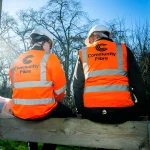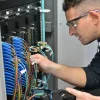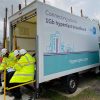Brsk Grow UK Full Fibre Broadband Cover to 450,000 Premises

Network builder and ISP Brsk, which is deploying a gigabit speed Fibre-to-the-Premises (FTTP) broadband network across the Midlands of England and beyond (rollout plan), have informed ISPreview that their coverage has grown to pass 450,000 homes (up from 358,000 on 10th Nov 2023). Customer take-up has also increased.
The operator – fuelled by an investment of at least £259m – is currently focusing most of its network build on parts of West Yorkshire, Lancashire, Greater Manchester, Cheshire, and the West Midlands – Birmingham and The Black Country, to be specific. But we should point out that the latest coverage figure falls slightly to 441,000 when looking at those deemed Ready for Service (the gap usually reflects wayleave delays in secured MDU coverage).
In addition, brsk informed us that they’re now home to a total of 28,000 customers, which is an impressive doubling of the 14,000 they reported on 21st Aug 2023. Otherwise, the operator’s long-term aim is to pass 1 million homes by 2026. Prices start at £23 per month for a 100Mbps (symmetric) package and rise to £32 for 900Mbps on a 24-month term.
Advertisement
The latest progress update is particularly notable because it occurs during a period where many other alternative networks are having to scale-back their deployments and cut jobs, largely due to rising build costs and high interest rates that make raising new investment difficult.
Mark is a professional technology writer, IT consultant and computer engineer from Dorset (England), he also founded ISPreview in 1999 and enjoys analysing the latest telecoms and broadband developments. Find me on X (Twitter), Mastodon, Facebook, BlueSky, Threads.net and Linkedin.
« BT Shipping its Final Paper Phone Books to UK Customers























































It’s hard to be excited by a 6% take-up.
I get it that it isn’t a particularly mature network, so take-up is naturally going to be on the low side at this point, but that still looks poor no matter how “accomodating” we let ourselves be.
Assuming an ARPU of £25 (which seems reasonable given their pricing), that is just £8.4m in revenue per annum.
Sure, they might double customer base again in each of the next two quarters, but that’d still only leave them at 112k customers, 650k RFS homes (at current build rate), and £34m revenue per annum.
If this company hasn’t taken on any debt, sure it’ll be a nice buy for a consolidator, but don’t expect it to be around in the long run.
What matters is how much take-up they’re generating in areas that have been live for 2-3 years and the cost to build (they’re PIA heavy, so it’ll be a low cost build). Sadly, we don’t have an answer to this yet, partly as they don’t yet have much maturity of coverage.
But it may be worth noting that Brsk’s equity partner, Advencap, is also invested in rival Netomnia – both are adopting a similar approach to build, but in different parts of the country. I thus wouldn’t rule out a “friendly” consolidation in the future, either.
interestingly they don’t have much overbuild with CityFibre or Fern. An obvious 3 way consolidation maybe?
PIA heavy build is low Capex upfront, but 90% of their 5 year PIA costs are non-revenue generating- that is a huge Opex problem that will sink them along side interest payments.
While each pole attachment is pence, it adds up very quick & ARPU of £25 doesn’t go very far until they get 20-30% takeup – if they can?
The absolute % matters far less than the CPPP: if you build at 500 CPPP you need double the takeup to break even than if the CPPP is at 250
Taking OPs math, if they double up in customers again, which is very feasible and under 20% which is the typical mature goal, it will mean 64m, which will mean a few years to pay back the capex
True but all things considered in this aggressive market it is impressive to double their connected customers since August 23. Shows people are disillusioned by the big 2. I have no alt net in my area and getting absolutely rinsed by VM for giga line over hybrid coax lol.
Going to be interesting 2 years to see how altnets merge etc.
Looking at the pole we have been connected to, for brsk, there seems to be 2 connections, on a street full of about 30 houses, there is about 5-6 houses connected. Other options for broadband on the street include Cable, gfast and fttc.
That being said, there has been some concerns in the wider area on the installation of poles, and the brsk rollout, where the council had to intervene, and speak to the business and it’s management inc the CEO. Maybe the negative press caused some issues with take up.
The big problem they all have is the high level of debt. The high cost of the infrastructure and the relatively low take up
It is less than £300 a year revenues per customer. May be a small profit on it but when you factor in the debt and capital costs its probably a loss
I don’t think they advertise enough directly to homes covered under their network
I’ve only received one leaflet from them since the road was covered, a year ago.
I signed up for BRSK Broardband last July to be active in September, it is now March still nothing done, and it is costing me more with my current provider with me not being in a contract, so I think I should be due some sort of compensation for extra cost I have had to pay while waiting for BRSK installation.
Contact them it’s probably a mistake, they only charge once the service is live.
The initial order is a pre order